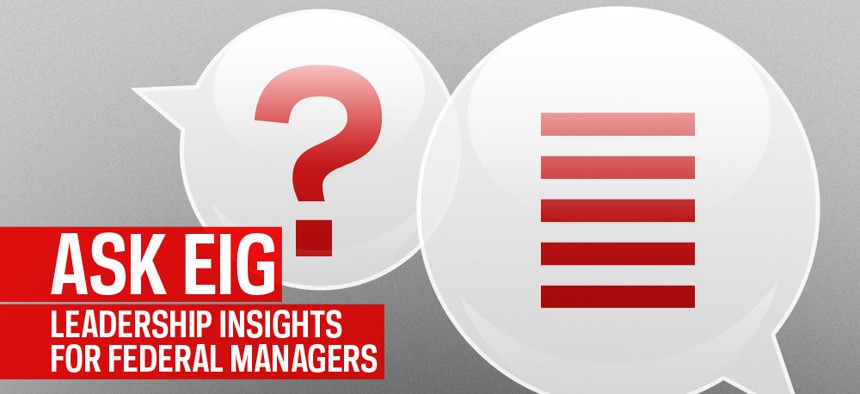3 Ways to Build Trust Between SESers and Political Appointees
Building trust takes time--try these tips to speed it up.
Ask EIG is your chance to seek answers to public sector management challenges and conundrums. Submit your questions here.
How do I, as a career Senior Executive Service (SES) member, best position myself to quickly develop trust with an incoming political appointee and to support their agenda while being able to also help educate and influence the appointee focusing on long-term sustainability in addition to the strong need to achieve short term results?
--Anonymous
Like the changing seasons of the year, Washington D.C. goes through its own seasonal changes marked by the departure of political appointees and the arrival of new ones. New appointees typically arrive with a desire to have an immediate impact but their appointments last only two to four years. This relatively short season for appointees creates predictable challenges for them and the agencies they lead.
All too often, appointees want to leave their mark by tackling problems, redirecting or reconfiguring the organization, creating new capabilities, or launching new services that they think support the current administration or respond to political needs.
But leading change in large organizations takes time and constancy of purpose: certainly more that two years is needed to significantly change any large organization. With such frequent turnover of appointees, even under the same administration, how can SESers help support the new appointee especially in the short run while making progress on the long-range strategies enacted by earlier appointees?
(HAVE A QUESTION? Submit your most pressing management questions below or click here)
In a prior posting (Ask EIG: 5 Steps to Stop a New Appointee From Killing Your Project), I described how selling your solution to a new political appointee is a mistake. In this posting, I elaborate on three steps for how you can quickly build trust and create understanding for both you and the political appointee so that you can support both the appointee and the long-term sustainability of your agency.
- Explore why that appointee chose to serve in their current capacity. Ask questions and listen carefully so that you better understand their motivation for accepting the position and what current and future success for them looks like. For instance, what does the appointee care about not only for the agency but also for their own personal, career, and life goals?
- By asking questions, focus the conversation on the appointee’s perspectives of the issues confronting the agency. For instance, what symptoms or indicators of various issues does the appointee know and care about? What data and evidence is the appointee aware of that signals these issues are real?
- Resist conversations that move quickly to the appointee’s solutions or policy recommendations by asking and exploring “why” the situation is occurring in the first place. If together you seek out the underlying root causes you are more likely to develop feasible and valuable solutions and policy recommendations. For instance, you can ask “Will you help me understand what root causes you see that are creating the situation?” Could there be an even deeper root cause?
These questions are a start but they do not guarantee that you will build trust. Some appointees may not be open to engaging in such conversations. If so, then building trust quickly simply may not be feasible. Trust will take a longer time to build (see Ask EIG: Are You a Leader With ‘The Goods’?).
But, if you are able to engage in conversations to understand the appointee’s motivations and perspectives and you collaborated to understand the root causes of the key issues that the appointee cares about, you will be in a much better situation to help the appointee achieve their objectives and support the long-term sustainability of your agency. Indeed, you will in a position to find those connection points where initiatives to support the agencies long-term sustainability can help deliver on the short-term results.
By asking and listening, you demonstrate good will because you are showing that you care about the appointee and that you are thinking about how to help them. By resisting selling them an agenda, you will demonstrate attributes of your leadership ability (attempting to sell usually fails, which demonstrates poor ability). And, by working through the root causes of the issues together, you will make it easer for them to assess your good character as you begin working on resolving these issues. Good will, good ability, and good character are the building blocks of trust.
Building trust quickly with any new political appointee is not easy; although damaging your trustworthiness is. The three steps listed above highlight that it is vital to engage in conversations that first build trust and create understanding before you try to propose or implement policies and solutions. Investing in building trust with each other is the foundation for achieving short-term results and long-term sustainability.
Duce a mente (May you lead by thinking),
Jackson Nickerson








